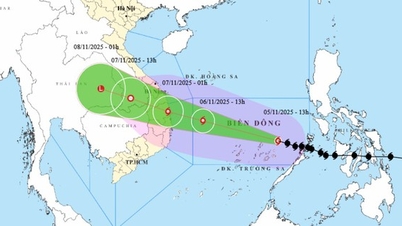My 8-year-old child sleepwalks at night, walks, laughs, cries, and talks to himself. Should I wake him up when he is sleepwalking? How dangerous is this condition? (Thu Hang, Ho Chi Minh City)
Reply:
Sleepwalking is a sleep disorder, a neurological disorder in which the patient performs actions such as walking, talking, and shouting while sleeping. Sleepwalking usually occurs 1-2 hours after the patient falls asleep.
Sleepwalkers often do not remember what they did while they were sleepwalking. They may talk, walk, eat, drive, or perform other actions while they were asleep. When sleepwalking, the person often opens their eyes, appearing to be awake but actually still asleep.
When suspecting sleepwalking, parents need to stay calm and avoid expressing personal emotions that may upset or panic the sleepwalker. Do not try to wake the sleepwalker because this can confuse, disorient or agitate the patient.

A doctor examines a patient showing signs of sleepwalking. Photo: Tam Anh General Hospital
It is necessary to ensure the safety of sleepwalkers when moving because their actions can be dangerous. Many cases open windows, climb onto balconies or use knives to cut food without realizing what they are doing. People around need to clean up sharp, dangerous objects around, close doors tightly, and gently guide the sleepwalker back to bed.
Sleepwalking is not usually dangerous for the sufferer. However, sleepwalking can cause health problems, increase the risk of injury such as falling down stairs or out of the house, collision with vehicles on the road. Sleepwalking disrupts sleep, can cause fatigue, loss of concentration the next day. The sufferer feels sleepy, lethargic, exhausted. Worrying about sleepwalking and other consequences can cause stress and negative feelings.
If your child's sleepwalking occurs frequently and lasts for a long time, you should take him or her to a neurologist for timely examination and treatment.
MD.CKI Nguyen Phuong Trang
Center for Neuroscience , Tam Anh General Hospital, Ho Chi Minh City
| Readers ask questions about neurological diseases here for doctors to answer |
Source link







![[Photo] Opening of the 14th Conference of the 13th Party Central Committee](https://vphoto.vietnam.vn/thumb/1200x675/vietnam/resource/IMAGE/2025/11/05/1762310995216_a5-bnd-5742-5255-jpg.webp)





























![[Photo] Panorama of the Patriotic Emulation Congress of Nhan Dan Newspaper for the period 2025-2030](https://vphoto.vietnam.vn/thumb/1200x675/vietnam/resource/IMAGE/2025/11/04/1762252775462_ndo_br_dhthiduayeuncbaond-6125-jpg.webp)












































































Comment (0)